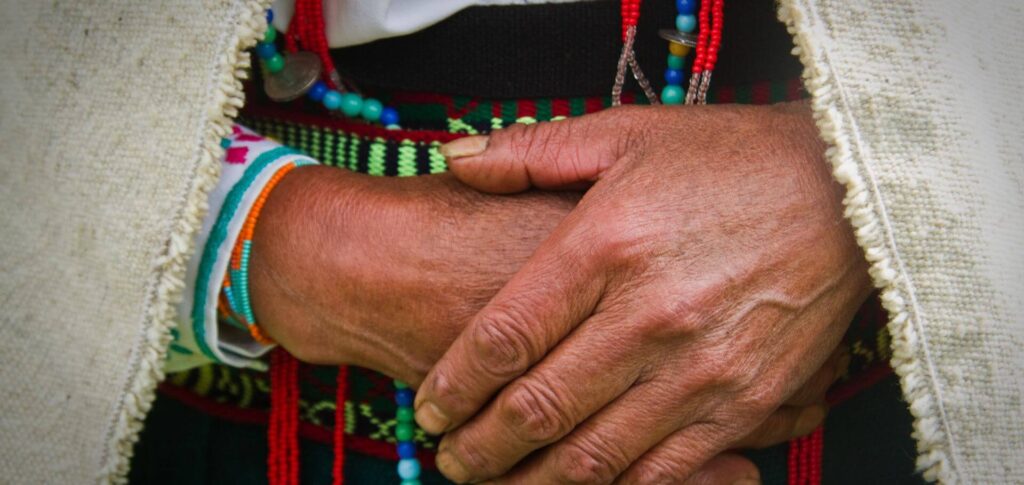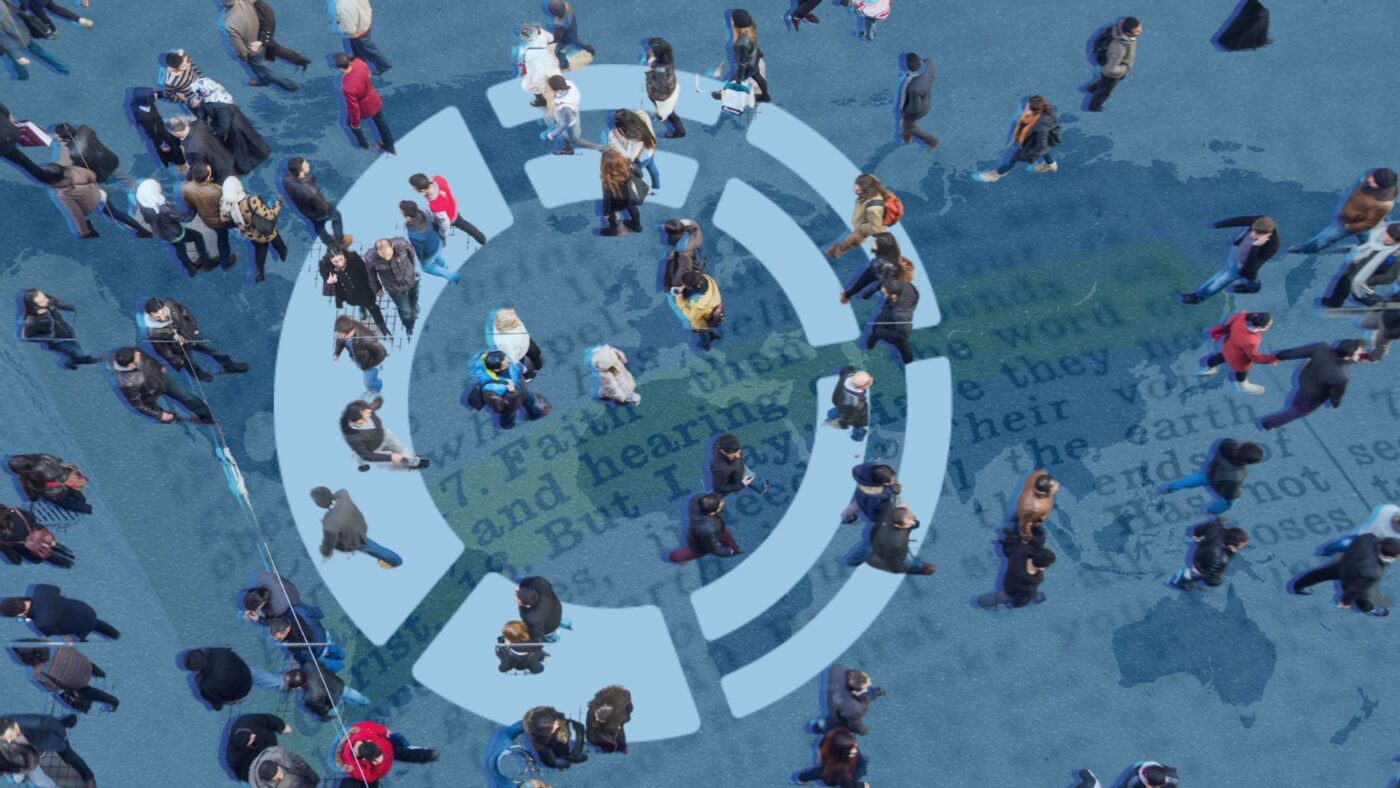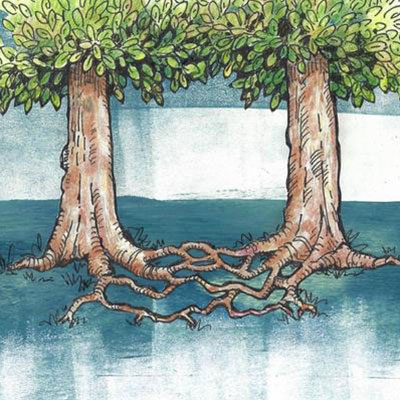Ethnicism
Israel was not ethnically monolithic, and the Bible clearly addresses the issue of ethnicism or ethnocentrism. In Luke 10:33, a Samaritan, a foreigner despised by Jewish people, was the one who exemplified compassion. In Luke 17:16, when Jesus healed the ten lepers, a Samaritan was the only person who came back to Jesus with humble gratitude. The story of the Tower of Babel in Genesis 11 shows that God confounded the language of people according to familial relationships and tribes of people, not according to their skin color or physical characteristics. Unfortunately, people throughout history have interpreted the Bible inaccurately to justify ethnic and racial discrimination. One example could be found in Genesis 9, where the curse of Canaan being the ‘servant of servants’ was used to justify the slavery of Africans. Many people believed that Ham’s descendants, who were cursed, were racially black. This article examines the history of ethnicism and Christianity and discusses implications for the Church and Great Commission efforts.

History of Ethnicism in World Christianity
Latin America
Historically, Christianity has been used to both justify and fight against ethnicism. Race and ethnic issues have been especially prominent in Latin America and Africa in the colonial and post-colonial eras. When conquistadores from Spain and Portugal subjugated the new continent at the beginning of the sixteenth century, they viewed their work as a religious crusade and used force to Christianize the natives. Moreover, they enslaved the indigenous population and exploited them economically. In 1552, Bartolome de Las Casas, a Dominican priest, rebuked the atrocities of the enslavement of indigenous people in his book A Brief Account of the Destruction of the Indies. His publication played a significant role in the abolishment of the indigenous slave system. To compensate for the lack of an indigenous workforce, the Spanish and Portuguese settlers started to import African slaves to Latin America between 1650 and 1860.
A massive African slave industry resulted in racial mixing among the indigenous population, Africans, and Europeans. A strict racial hierarchy was created, and indigenous people and African slaves were harshly discriminated against. The Spanish and Portuguese settlers’ racial attitudes had been formed during their religious crusade against the Muslims who had conquered the Iberian Peninsula in the 700s. European Christians viewed dark-skinned Muslims from North Africa as intruders and began to associate dark skin with heathenism. During the reconquest, the triumphalism and hatred toward dark-skinned Muslims were at their peak in the Iberian Peninsula. Race and religion became intricately intertwined, and Spanish and Portuguese Christians became defensive of their Christian faith and ‘purity of blood’. Indigenous people and African slaves were treated as inferior beings who were unable to have full spiritual insight. They were prohibited from many civic and religious privileges and were segregated from people of European descent. They were not permitted to be ordained or join religious orders. While the racial hierarchy system no longer exists, ethnicism continues to affect Latin American churches today.
While the racial hierarchy system no longer exists, ethnicism continues to affect Latin American churches today.
Latin American Christians continued discovering new, creative ways to indigenize Christianity and bring racial liberation. A prime example would be Lady Guadalupe, an indigenized Virgin Mary of Latin America. Traditionally, it is believed that the Virgin Mary appeared to Juan Diego, a poor indigenous worker in Mexico City. The Virgin Mary, or Guadalupe, was an indigenous woman in her Latin American dress. She gave a message of hope and compassion for all people, bringing comfort to indigenous Christians who had suffered from violence from the settlers. Lady Guadalupe serves as a symbol of compassion, hope, and racial liberation for Latin American Catholics.
Africa
Race issues are deeply interwoven in church history in Africa, especially in South Africa. In 1948, apartheid became the official law, affecting every dimension of South African citizens’ lives. Apartheid referred to racial separatism, where people were classified according to race and were forced to live accordingly. Through the 1950s, a series of laws put economic, educational, political, and religious restrictions on Africans. Many advocates of apartheid argued that apartheid had biblical grounds, and even church leaders supported the separation of races. Using the tower of Babel analogy, the religious supporters of apartheid argued that churches, among other gatherings, must be separated according to race because people were created differently and God willed separateness.
Apartheid was challenged in 1982 when the World Alliance of Reformed Churches (WARC) declared it was a heresy to support racial separatism. WARC emphasized the unity of common humanity, especially the communion among Christians. In 1985, mainly black South African theologians issued the Kairos Document based on liberation theology. Other parts of the world began to challenge racial injustice in South Africa. American churches and companies started disinvestment and economic boycotts. South Africa was denied loans from the world banking system. Apartheid officially ended in 1990 when South African President F.W. de Klerk released Nelson Mandela from prison. Nelson Mandela was the leader of the African National Congress and had been imprisoned for twenty-seven years.
Desmond Tutu and Nelson Mandela created the Truth and Reconciliation Commission (TRC) in 1996. The TRC’s ultimate goal was forgiveness and reconciliation, but Tutu made it clear that true healing and reconciliation were impossible without confession and repentance. Many African countries believe in the philosophy of ubuntu, which refers to the interconnectedness of all humanity. According to this ideology, all human beings are dependent and responsible for one another, thus emphasizing the communal aspect of religious experience. Tutu also utilized ubuntu as the primary driving theology of TRC.
Around the world, ethnocentrism, racism, and xenophobia continue to be a problem, and churches have the ability and responsibility to play a prophetic role. Pew research shows that younger generations are more keenly aware of the connection between their faith and social responsibilities, demonstrating that by 2050, churches’ engagement will increase in the fight against ethnicism.
Around the world, ethnocentrism, racism, and xenophobia continue to be a problem, and churches have the ability and responsibility to play a prophetic role.

Implication of Ethnicism for the World and the Church
As we near 2050, the intersection of ethnicity, globalization, and diversity becomes increasingly crucial. This section explores the impact of ethnicity on global dynamics, the Christian church, and the reinterpretation of the ‘Great Commission’.1Ethnicity presents challenges and opportunities for the global church’s mission of unity within diversity. This era is pivotal for the church to address ethnic identities, global interactions, and evangelization approaches. A key challenge is the church’s historical role in colonial oppression.2 Addressing these issues is vital for promoting global peace, effective evangelism, and discipleship across ethnic groups. Understanding ethnicity’s complex impact is essential for future strategies aligned with the Great Commission in a pluralistic world.
Impact on the world
Ethnicism, in the context of an increasingly globalized world, profoundly influences global sociopolitical landscapes, impacting the church and its Great Commission mission up to 2050. Globalization, driven by technological advancements, facilitates interconnectedness, promoting the exchange of ideas and traditions among ethnic groups. This potentially reduces barriers, fostering effective communication and cooperation, thus benefiting the underlying goal of the Great Commission. It encourages cross-cultural dialogue, shaping the church into a boundary-crossing, socially engaged community receptive to the gospel across ethnic lines.3
Ethnicity presents challenges and opportunities for the global church’s mission of unity within diversity.
However, globalization can also exacerbate ethnic conflicts and divisions. Dominant cultures and international corporations may marginalize certain groups, and migration can lead to social dislocation, intolerance, and discrimination. These negative aspects challenge the church’s mission, creating distrust and hostility and hindering the spread of the gospel among conflicting groups. Acknowledging ethnicism’s dual potential to both unite and divide is crucial. A proactive approach is needed to shape global relations and religious missions, maximizing positive impacts while mitigating negative ones.
Impact on the church
Missionary activities in developing countries have faced criticism for perpetuating imperialism and colonialism.4 These activities were often seen as part of the colonial project, demonizing local cultures as inferior.5 Critics like Musa Dube and GM Soares-Prabhu argue that missionaries were, knowingly or unknowingly, imperial agents. Their activities were used for cultural domination, imposing foreign values and norms, and undermining indigenous cultures and languages.6 The goal was not just conversion but also acculturation to Western standards, reinforcing colonizers’ hegemony.7
Additionally, there is a need to address the historical perspectives, especially the gendered nature of the Great Commission. In postcolonial settings, this commission has been used to reinforce patriarchal structures, marginalizing women’s voices and religious experiences.8 Consequently, many postcolonial communities have reinterpreted the Great Commission, detaching it from colonial and patriarchal legacies. They have reimagined it as a call for social justice, liberation, and affirmation of indigenous cultures and female leadership within the church.
As the world progresses towards 2050, the global church is anticipated to transform, especially in how the Great Commission is perceived and enacted. The hope is to shift toward a more dynamic dialogue influenced by diverse human experiences rather than a static approach. The Great Commission missionary mandate is expected to be subject to continuous contextualization, reinterpretation, and resonance with local cultures’ histories and identities. The aim is to foster a more inclusive and culturally sensitive interpretation of the Great Commission, enhancing its relevance in an increasingly interconnected yet diverse world.
Impact on the Great Commission
The Great Commission, in the context of ethnicism, presents significant interpretative challenges. 9 Understanding this within the Bible’s contextual framework is crucial, especially regarding its implications for evangelism until 2050. Central to this discourse is the Judeo-Christian belief from Genesis 1:26–27, which asserts that every human is created imago Dei (in God’s image), establishing individuals’ intrinsic worth regardless of ethnicity. This principle is echoed in the parable of the Good Samaritan (Luke 10:25–37),10 which dismantles ethnic prejudices and underscores sacrificial love towards all neighbors. Such narratives can guide intercultural dialogue and mutual respect.
The Acts of the Apostles offers further insights. Peter’s realization in Acts 10:34–3511 emphasizes God’s impartiality and promotes inclusivity, counteracting ethnocentric biases. The Jerusalem Council’s resolutions (Acts 15) and theological claims in Galatians 3:28 and 1 Corinthians 9:20–23 present inclusive paradigms for Christian engagement, subverting unequal power relations and challenging ethnocentrism while preserving individual ethnocultural identities.12
Ethnicism can be harnessed positively to build bridges and engage in cross-cultural missions.
Ethnicism can be harnessed positively to build bridges and engage in cross-cultural missions. The eschatological vision in Revelation 7:913 exemplifies a faith community transcending ethnic boundaries. Given ethnicism’s challenges to the church, the biblical model encourages recognizing each person’s inherent value and advocates for unity and mutual understanding across ethnic divides. This approach provides a theologically grounded strategy for addressing ethnic relations within global Christian witness and evangelism up to 2050 and beyond.
Understanding the Great Commission in Christian contexts has evolved significantly, especially in postcolonial settings. While credited for advancing education and healthcare globally, its history is marred by instances where missionaries, intertwined with colonial powers, disrupted local cultures and values. This association has painted Christian missions with the brush of colonial oppression. As ethnicism rises globally, the church faces a pivotal moment. This rise could significantly and unpredictably affect global communities and religious landscapes. Influenced by ethnicism, these global dynamics have diverse and intricate effects on how the church understands and interprets the Great Commission. The future, with the potential to either bridge or widen gaps, hinges on the church’s capacity to develop theologies and ethics of mission that resonate with the experiences of the communities they serve. These theological ethics should be transformative, aligning with God’s mission of reconciliation, healing, self-giving love, and restorative justice, central to the Great Commission.

Challenges and Opportunities
The Lausanne Movement’s mission to proclaim the gospel, make disciples, develop Christlike leaders, and make kingdom impact for every people and place assumes the notion that there are different kinds of people groups. One important aspect of the missional movement is the recognition that people are different across space and time. One way to begin describing this difference is through racial-ethnic categories. This article takes racial-ethnic categories to be generated by material differences of geography, history, culture, and political economy. For this author, race connotes a social construction of identity attached to phenotypical difference while ethnicity connotes a socially constructed identity related to culture—for the purpose of this article, the focus will be on language use as a primary feature of culture. Moreover, I take ethnicism to be similar to the social challenges of ethnocentrism and racism. Ethnicism, ethnocentrism, and racism are social ills the Christian church should seek to avoid and ameliorate.
Focusing on the universality of the gospel
There are two challenges that confront the Great Commission from the perspective of ethnicism. The first challenge to the Great Commission is the notion of the universality of the Christian gospel for all people across space and time unmarked by ethnic particularity. It is true that the Christian gospel has universal scope and appeal when we look especially to places like Galatians 3:28, which states that ‘There is neither Jew nor Greek, there is neither slave nor free, there is no male and female, for you are all one in Christ Jesus.’ While the gospel of Jesus Christ is for all people across space and time, we can forget that our witness to this gospel is always communicated within a particular and local context and culture.
When we evangelize, we never proclaim the gospel in a generic, universal human language. The gospel is only ever proclaimed through the particularity of a local culture and language. Inclusion in the body of Christ through faith in Christ is only ever achieved through the particularizing work of the Holy Spirit within a local culture’s language. A distinctive feature of the Christian faith is its limitless translatability (Lamin Sanneh) to all people groups through specific contextual methods. So it is crucial for our fidelity to the Great Commission to always consider the universal appeal of the gospel but only ever through its socially embodied communication. Once we agree that the Great Commission can only ever be achieved through local languages (and not a generic, universal language), then we must acknowledge the important, significant, and necessary role of ethnicity. The cultural-linguistic character of the Christian faith (George Lindbeck), and thus the social and ethnic embodiment of the gospel are non-negotiable features of the Great Commission and the transmission of faith. Without acknowledging this appropriate ethnic character of all efforts in the Great Commission, our emphasis on the universal aspect of the Great Commission will mask our particular ethnic witness to the gospel. There is no acontextual, disembodied, or generic witness to the saving gospel of Christ.
Conflating Christian identity and ethnic identity
The second challenge to the Great Commission is the opposite of the first challenge. Once Christianity is viewed as a cultural-linguistic religion embodied by and for particular people groups speaking particular languages, the temptation (and thus challenge for the Great Commission) is for that ethnic identity to become co-extensive with Christian identity. This has multiple, pernicious forms whether in the state-established form of Christian nominalism that Søren Kierkegaard complained about in Danish Lutheranism, or in virulent forms of Christian nationalism as increasingly evident in places like the U.S. To be Lutheran or Christian in Kierkegaard’s time was simply to be Danish and thus to be Christian in name only (thus the nominalism).
The intertwining of particular ethnic and racial identities with Christian identity occurs in part because of the loss of the universal character of Christian identity that is recognized as crossing people groups. There is a very legitimate sense in which conversion to Christianity is crossing a boundary to what the Bible calls the people of God (Judges 20:2, 2 Samuel 14:13; Hebrews 4:9; Revelation 21:3). Scripture speaks of the people of God as a new people with a new identity written in our hearts through the new covenant (Jeremiah 31:31–34) established by the blood of Christ. Scholars have called this Christian language about peoplehood a form of ethnic reasoning (Denise Buell). When Christian identity becomes fused with ethno-racial identity, the ethno-racial identity is problematically baptized and divinized. The sins of the human spirit are then attributed to the Holy Spirit which then damages the collective witness of the body of Christ.
In the first challenge, Christians are forgetful of the role their ethnic identity plays in their Christian identity and desire to do good in the world as Christians. In the second challenge, Christians are self-conscious of their particular ethnic identity and seek to dominate other ethnic groups through Christian rhetoric.

Path Forward: Universal and Particular Nature of Christianity
The path forward through the Scylla and Charybdis of the blindly universalizing and pernicious particularizing challenges is to rightly coordinate the universal and particular features of the Christian faith. The path forward is not either-or. Christianity is both a universal religion of salvation and transformation for all people across space and time, and Christianity only ever takes root in local communities of particular cultural-linguistic practices. These are not competing nor exclusive commitments. Ethnic identity is essential for understanding Christian identity, but this does not mean that there is not a universal Christian identity for all people across space and time. Christian identity is never separate from ethnic identity, but this does not mean that Christian identity is simply reducible to ethnic identity. The key mechanism that coordinates the universal and particular features of the Christian faith are the social practices of the church that are mutually recognized as Christian practices across space and time by different people groups. This is a claim about the Spirit-filled catholicity of the body of Christ. The challenge for the work of the Great Commission is to recognize the radical, boundary-crossing work of the Holy Spirit that continually shines a light on the one Lord and Savior Jesus Christ (J.I. Packer).
Sometimes there are new challenges facing the catholic church that require spiritual discernment and recognition. This recognition cannot be determined a priori but must be discerned spiritually through prayer and fellowship in mixed gatherings. With the rise of global movements that shrink our world through commerce and technology along with the continued exploitation and domination of marginalized people groups, the spiritual discernment of the work of the Holy Spirit will need to continue in gatherings such as the 2024 Fourth Lausanne Congress.
Resources
- Bocala-Wiedemann, T. J. (2022). “Social media as a tool for evangelism among youth and young adults.” Great Commission Research Journal, 14 (2022): 19-34.
- Boesak, Allan. Black and Reformed: Apartheid, Liberation, and the Calvinist Tradition. Eugene, OR: Wipf and Stock, 2015.
- Buell, Denise. Why This New Race: Ethnic Reasoning in Early Christianity. New York City: Columbia University Press, 2005.
- Chung, Y. “A postcolonial reading of the Great Commission (Matt 28:16-20) with a Korean Myth.” Theology Today 72 (2015): 276–288. https://doi.org/10.1177/0040573615601466
- Cronshaw, D. “A Commission ‘Great’ for Whom? Postcolonial Contrapuntal Readings of Matthew 28:18–20 and the Irony of William Carey.” Transformation 33 (2016):110–123. https://doi.org/10.1177/0265378815595248
- Dube, Musa W. “Go therefore and make disciples of all nations (Mt 28:19a): A postcolonial perspective on biblical criticism and pedagogy. Pages 224–46. In Teaching the Bible: The Discourses and Politics of Biblical Pedagogy. Edited by Segovia, F and Tolbert, M A. Maryknoll, NY: Orbis Books, 1998.
- Dunaetz, D. R., & Priddy, K. E. “Pastoral attitudes that predict numerical Church Growth. Great Commission.” Research Journal 5 (2014): 241–256.
- Hong, E., & Botner, M. “Competing Notions of Humility: Why Korean Americans Do Not Need to Abandon Confucius to Get to Christ.” Great Commission Research Journal 14 (2022):19–29.
- Lindbeck, George A. The Nature of Doctrine: Religion and Theology in a Postliberal Age. 25th anniversary ed. Louisville, KY: Westminster John Knox Press, 2009.
- Oduyoye, Mercy Amba. Daughters of Anowa. African Women and Patriarchy. Maryknoll (NY): Orbis Books, 1995.
- Packer, J. I. Keep in Step with the Spirit: Finding Fullness in Our Walk with God. Rev. and enlarged ed. Grand Rapids, MI: Baker Books, 2005.
- Patte, Daniel. “Reading Matthew 28:16-20 with Others: How It Deconstructs Our Western Concept of Mission.” HTS 62 (2006): 521–557.
- Sanneh, Lamin O. Translating the Message: The Missionary Impact on Culture. 2nd ed. Maryknoll, NY: Orbis Books, 2008.
- Stanley, Brian. Christianity in the Twentieth Century: A World History. Princeton: Princeton University Press, 2018.
- Thiong’o, Ngugi Wa. Decolonizing the Mind: The Politics of Language. London: James Curry, 1994.
- Tisby, Jemar. The Color of Compromise: The Truth about the American Church’s Complicity in Racism. Grand Rapids, MI: Zondervan, 2019.
- Tutu, Desmond. No Future Without Forgiveness. New York: Doubleday, 2000.
- Wainwright, Eliane M 1998. Shall We Look for Another: A Feminist Rereading of the Matthean Jesus. Maryknoll, NY: Orbis, 1998.
Endnotes
- Though the missiological-theological underpinnings of the Great Commission are encapsulated in the post-resurrected Jesus’ injunctions to the disciples in Matthew 28:19-20, the label the ‘Great Commission,’ which is now used as a technical phrase in Christian theology and mission, was popularized and normalized in the 19th century, particularly among Protestant missional movements. The text gave missionaries, evangelists, and theologians legitimization for what they saw as missionary imperative. The Baptist missionary to China and founder of the China Inland Mission, Hudson Taylor, is often cited as an embodiment of the Great Commission. Cf. “The Bible in Hudson Taylor’s Life and Mission, Part 1 & II” Global China Center, https://www.globalchinacenter.org/analysis/2014/03/28/the-bible-in-hudson-taylors-life-and-mission-part-ii
- Cf. Musa Dube,; Pui-Lan Kwok, Postcolonial Imagination and Feminist Theology (Louisville:
- Cf. Daniel Patte, “Reading Matthew 28:16-20 with Others: How It Deconstructs Our Western Concept of Mission,” HTS 62 (2006): 521–557; Choan Seng Song. Theology from the Womb of Asia (Wipf and Stock Publishers, 2005); “Go therefore and make disciples of all nations (Mt 28:19a): A postcolonial perspective on biblical criticism and pedagogy,” in Teaching the Bible (ed. Fernando Segovia and Mary Ann Tolbert; Orbis Books: Maryknoll, NY, 1998); 224–245.
- Cf. Dube, “Go therefore and make disciples of all nations”; Song. Theology from the Womb of Asia; Young Chung, “A postcolonial reading of the Great Commission (Matt 28:16-20) with a Korean myth,” Theology Today 72 (2015): 276–288. https://doi.org/10.1177/0040573615601466
- Cf. Kwok, Postcolonial Imagination & Feminist Theology, 61.
- Cf. Dube, “Go therefore and make disciples of all nations (Mt 28:19a)”; Daniel Patte, “Reading Matthew 28:16-20 with Others: How It Deconstructs Our Western Concept of Mission,” HTS 62 (2006): 521-557; Ngugi Wa. Thiong’o, Decolonising the Mind: The Politics of Language in African Literature (London: J. Currey, 1986); Bengt Sundkler and Christopher Steed, A History of the Church in Africa. Soares-Prabhu argues that the Christian mission was “a mission more preoccupied with the aggrandizement of the missioner rather than the welfare of the missionized” (“Two Mission Commands: An Interpretation of Matthew 28:16-20 in the light of a Buddhist Text,” 333). He strongly critiques “the traditional triumphalistic exegesis of the Matthean passage” (Soares-Prabhu, 319); Bengt Sundkler and Christopher Steed, A History of the Church in Africa (Cambridge, UK: Cambridge University Press, 2000); Elizabeth Isichei, A History of Christianity in Africa: From Antiquity to the Present (Grand Rapids, Mich.: William B. Eerdmans Publishing, 1995).
- Cf. Musa, “Go therefore and make disciples of all nations (Mt 28:19a)”; Rs Sugirtharajah, “A postcolonial exploration of collusion and construction in biblical interpretation,” in The Postcolonial Bible (ed. Sugirtharajah RS. “Sheffield: Sheffield Academic Press, 1998): 91–116; The Bible and the third world: Precolonial, colonial and postcolonial encounters, (Cambridge: Cambridge University Press, 2001); Darren Cronshaw, “A Commission ‘Great’ for Whom? Postcolonial Contrapuntal Readings of Matthew 28:18–20 and the Irony of William Carey,” Transformation, 33 (2016): 110–123. https://doi.org/10.1177/0265378815595248
- See Mercy Amba Oduyoye, Daughters of Anowa. African Women and Patriarchy (Maryknoll (N.Y.): Orbis Books, 1995);Pui-Lan Kwok, Postcolonial Imagination and Feminist Theology (Louisville:
- While acknowledging the complicated reception history of missionary activities in Sub-Saharan Africa, Lamin Sanneh has extensively investigated the colonial legacy of missionary activities and how indigenous communities reappropriated the “Great Commission” to legitimize local autonomy and cultural preservation. Sanneh also pointed out, rightly, that the translation of the Bible into local languages has not only indigenized Christianity but also motivated, energized, and upheld local cultures and dialects against colonial homogenization. Cf. Lamin Sanneh, “Disciples of All Nations: Pillars of World Christianity” (New York: Oxford University Press, 2008; Translating the Message: The Missionary Impact on Culture (Maryknoll: Orbis Books, 1989); “Christian Mission and the Pluralist Milieu: The African Experience,” Missiology: An International Review, Vol.XII, (October 1984). See Jehu Hanciles, Euthanasia of a Mission: African Church Autonomy in a Colonial Context (Westport, Conn.: Praeger, 2002).
- The ‘Good Samaritan’ parable in Luke 10: 34–35 emphasizes love across ethnic lines.
- Acts 10:34–35: ‘Then Peter began to speak to them: “I truly understand that God shows no partiality, but in every people, anyone who fears him and practices righteousness is acceptable to him’”(NRSVUE). Acts 10:34-35 underscores God’s impartiality and inclusivity.
- The Jerusalem Council and teachings in Galatians 3:28 and 1 Corinthians 9:20–23 provide inclusive Christian paradigms.13.Revelation 7:9: ‘After this I looked, and there was a great multitude that no one could count, from every nation, from all tribes and peoples and languages, standing before the throne and before the Lamb, robed in white, with palm branches in their hands.’ ((NRSVUE).
- Revelation 7:9: “After this I looked, and there was a great multitude that no one could count, from every nation, from all tribes and peoples and languages, standing before the throne and before the Lamb, robed in white, with palm branches in their hands.” (NRSVUE)









